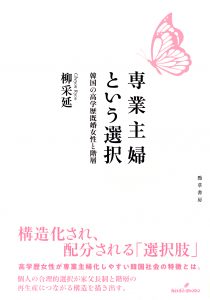
Title
Sengyo-Shufu to iu Sentaku (The Choice of Becoming a Full-time Housewife - Highly-Educated Married Women and Social Stratification in South Korea)
Size
308 pages, A5 format
Language
Japanese
Released
February, 2021
ISBN
978-4-326-60333-6
Published by
Keiso Shobo
Book Info
See Book Availability at Library
Japanese Page
This book explains the background and history of the phenomenon in which many highly-educated women are becoming full-time housewives in South Korean society.
Since the 1960s, South Korea has undergone modernization and industrialization, which have led women to become more highly educated and the family structure to become more commonly aligned with those of Europe and the United States since the 1990s. However, a phenomenon generally expected in such a society, that is, “the more highly-educated women are, the larger role they play in the labor market,” has yet to be seen in reality. In South Korea, a country that has been subjected to a greater degree of compression than Japan given its much more rapid rate of industrialization, the norms of a traditional family and roles are still deeply ingrained into society, despite the fact that more women are becoming highly educated, more high-level professions are being adopted in workplaces due to computerization, and more interest is being directed toward the gender equality movement than in Japan. Under such circumstances, many highly-educated women in South Korea have been making the choice to become full-time housewives without working outside the home. In this book, the process of how this option came to be established is revealed through an analysis of South Korea’s statistics and policy documents, as well as women's magazines and newspaper articles since the 1960s.
It is argued that the phenomenon where women’s high educational backgrounds are not being utilized in the labor market has been caused by the country’s persistent gender roles and norms in the division of labor. In recent years, it has also been linked to the role that mothers play in educating children. In other words, the phenomenon has been explained by a normative theory that claims that the role of mothers has increased due to social and cultural circumstances such as familism and the neoliberal competition that has intensified since the 2000s. However, by clarifying that there are aspects of the recent phenomenon that cannot be reduced to the existing gender roles and norms in the division of labor, this book identifies the limitations of the normative theory and cultural explanations, and places focus on the shift in women’s attitudes caused by macro-level changes in the social structure of South Korea, and the significance of women’s positions and roles from the perspective of highly-educated women who are full-time housewives.
In the perception of these women, becoming a full-time housewife (the choice of becoming a “full-time mom” who is a self-proclaimed manager of their children’s education) is a reasonable choice that is recognized as an alternative to avoiding conflicts with paternal relatives, pursuing equality in domestic roles, and white-collar jobs in the midst of social changes such as the mismatching of jobs and educational backgrounds, and the increasing economic inequality. The argument made in this book is that such a choice has become a tool that allows highly-educated women to form a new normative lifestyle and to visualize differences in the social stratification, which is in turn resulting in the creation of a new system of patriarchy. Furthermore, the book also suggests that the said outcomes may bring about unexpected consequences where South Korea’s system of patriarchy helps to recreate and ingrain the social stratification, and to trigger certain demographic phenomena.
This book depicts the overall picture of the changes surrounding women in South Korea, which has experienced a compressed modernity and is undergoing drastic changes, and touches on not only the conflict between men and women but also that between generations that result from the country’s patriarchal society.
We hope that you will not only learn about South Korean society but will also become aware of the system of patriarchy and gender issues in Japanese society through this book.
(Written by: Cheyon Ryoo / February 04, 2022)
Related Info
The 1st UTokyo Jiritsu Award for Early Career Academics (The University of Tokyo 2020)
https://www.u-tokyo.ac.jp/ja/research/systems-data/n03_kankojosei.html




 eBook
eBook